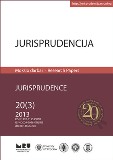Susijungimas kaip nuosavybės teisės įgijimo ir praradimo pagrindas Lietuvos civilinėje teisėje
Accession as a Mode of Acquisition and Loss of Ownership in the Lithuanian Civil Law
Author(s): Ramūnas BirštonasSubject(s): Law, Constitution, Jurisprudence
Published by: Mykolas Romeris University
Keywords: property right; thing; ownership; accession; Civil Code
Summary/Abstract: The aim of the article is to answer the question if accession can be maintained as a separate and independent mode of acquisition and loss of ownership in the Lithuanian civil law. Although this mode takes its beginning in the Roman law and is well-known in other European jurisdictions, the situation in Lithuania is less clear because the accession is almost totally absent from the legal texts of the Lithuanian positive civil law, court decisions and legal doctrine as well. Thus, a legal analysis confined to the linguistic analysis of law would come to the conclusion that Lithuanian law functions without the accession. Nevertheless, a deeper analysis of the Lithuanian Civil Code and case law reveals a different view. To respond to the posed question, the article analyses the functions and the concept of accession as one of the aspects of a broader property law principle, namely, of unity. The essence of the latter is that one thing presupposes one right of ownership and it is inconceivable to hold several full ownerships into the same thing. In this respect, accession plays an important role protecting the legal interests of the third parties. Also, the application of accession in other continental European countries and the solutions proposed by the Draft Common Frame of Reference is analysed. Further, the analysis turns to the Lithuanian positive law and case law. In spite of the lack of express reference to the accession rule, careful analysis shows that, in fact, the accession rule is established in the Lithuanian Civil Code, albeit it could be found in various forms and in several different units of the Civil Code. Also, Lithuanian courts routinely apply the rules on accession in practice. Even more, the analysis shows that the Lithuanian Civil Code is not devoid of the rules of accession, but, on the opposite, this legal institute is over-regulated and, in part, incoherent. This quality can be explained as a consequence of an imprecise legal drafting. The final conclusion is drawn that accession is a separate and fully working legal institute of Lithuanian civil law, although to reach its coherent application a certain interpretative position should be adopted.
Journal: Jurisprudencija
- Issue Year: 20/2013
- Issue No: 3
- Page Range: 1081-1094
- Page Count: 14
- Language: Lithuanian

